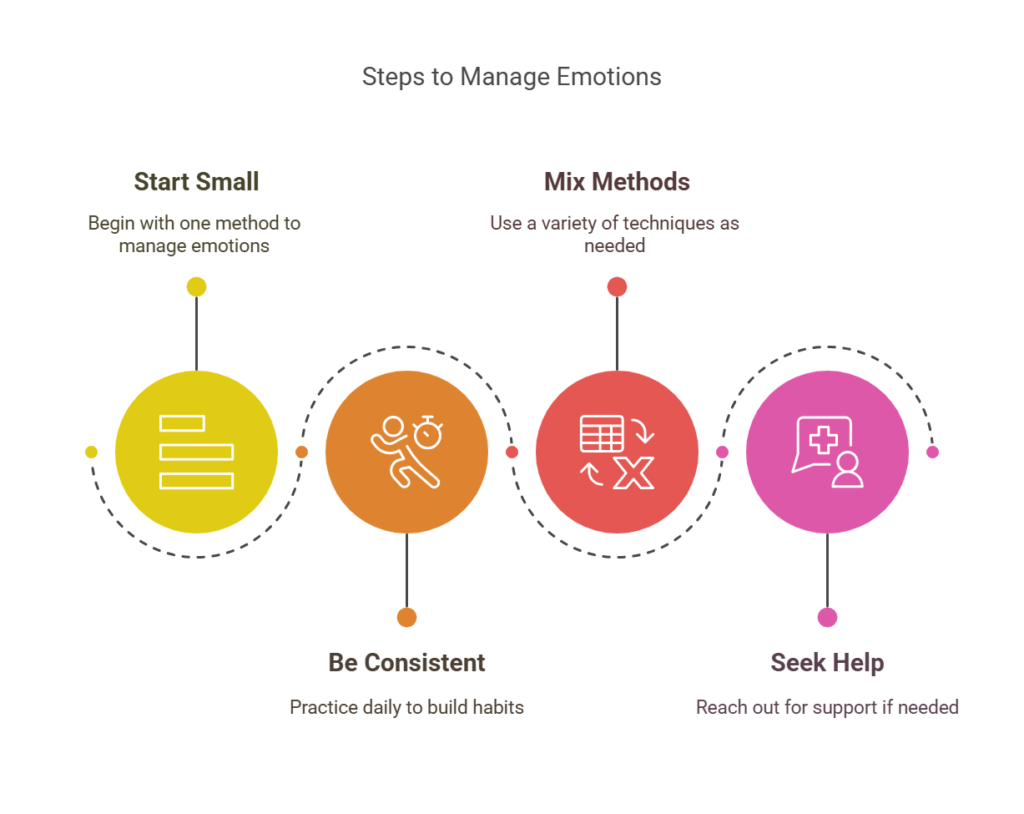Managing anger can feel tough. It may show up as tension, clenched teeth, or raised voices. Anger can harm friendships, work life, and health. Dr. Williams has studied anger and aggression for decades. He suggests simple steps that help people calm down and avoid harm. These methods blend practical skills with insights from therapy research. Two studies, one from the National Library of Medicine and one from ResearchGate, support these approaches. They show that structured anger steps can help people regain control. Below are 12 Dr. Williams approved methods to manage anger and aggression. Each method can work by itself or with other tips. You can try them at home, with friends, or in a support group. Change may take time, but these steps lead to steadier moods and better behavior.
1. Keep a Hostility Log
Write down each time you feel angry. Note the trigger, time, and your reaction. A log helps you see patterns in your anger. Research from PMC shows that tracking feelings helps people gain control. When you notice a pattern, you can plan to avoid or change the trigger. This log is a simple tool that makes you aware of your anger. With time, you may spot small changes that lead to big wins.
Using a notebook or an app makes this task easy. Each log entry builds a picture of your anger. Over weeks, the log shows you the recurring causes. This awareness is the first step to change. The log also lets you celebrate when you respond calmly. Keeping this record is a practical way to start managing anger.
2. Pause and Breathe Deeply
When anger begins to rise, pause for a moment. Stop what you are doing. Take a deep breath. Inhale slowly through your nose and exhale through your mouth. Count slowly to five. This pause gives your body a chance to calm. Studies on deep breathing, as noted on ResearchGate, show that slow breaths lower stress hormones.
Practice deep breathing even when you are calm. This builds a habit you can use when anger hits. Each deep breath sends a clear signal to your brain to relax. Use this method at work, at home, or while driving. With regular practice, you learn to use your breath to break the anger cycle. Deep breathing is a simple, effective tool that you can use anywhere.
3. Use a Support Network
Talk to someone who understands you. Share your anger and stress with a friend or family member. A support network helps you see situations from a different view. Research shows that sharing your feelings can lower stress and anger. When you speak up, you release built-up tension. A listening ear can calm you down and help you see new ways to handle the situation.
Make it a habit to check in with someone you trust. This could be a daily chat or a weekly meeting. A strong support network gives you comfort and balance. It helps you feel less alone in your struggles. The act of talking can bring relief and help you learn new ways to manage anger.
4. Challenge Negative Thoughts
When anger strikes, examine your thoughts. Ask yourself if they are fair and based on facts. Negative thoughts can fuel your anger. Write down the thought that makes you angry. Then, write a kinder, fair version of that thought. Research on anger management shows that rethinking your thoughts can lower anger. This step helps you see the real situation clearly.
By challenging negative ideas, you give yourself the chance to choose a better reaction. This practice takes time but grows stronger with repetition. Over days and weeks, you may find that you react less harshly. Changing your thoughts is a practical way to change your feelings. This step is simple yet powerful for lowering anger.
5. Practice Empathy
Try to see the situation from the other person’s view. Ask yourself why they acted the way they did. Remember that people make mistakes. Empathy helps reduce your anger by opening your mind. Studies show that empathy can lower stress and improve relationships. By understanding the other side, you may feel less hurt and less inclined to react with anger.
Take a moment before you react. Think about what the other person might be facing. This does not mean you excuse their behavior, but it helps you see a fuller picture. Practicing empathy builds better communication and reduces conflicts. It is a gentle way to defuse anger and connect with others.
6. Use Humor
Find a small reason to laugh when you feel upset. Look for the funny side of a mistake or a small error. Humor can break the tension and lower anger. Research indicates that a good laugh reduces stress and shifts mood. Even a brief laugh can ease a heavy moment and clear your mind.
Keep a list of funny stories or videos that make you smile. When anger rises, take a short break to enjoy a laugh. Humor helps you see that not all is lost in a tough moment. This light approach can interrupt the anger cycle and bring calm. Using humor is a practical tip to help you reset your mood.
7. Take a Short Break
When anger builds, step away from the trigger. Take a few minutes to leave the scene. This break gives you time to think and calm your body. A short pause can lower stress and help you regain control. Research on PMC shows that taking breaks can lower anger levels. Use this time to walk outside or sit quietly in a safe spot.
Set a timer for five minutes if needed. Use these few minutes to relax or stretch. A change of scenery helps your mind reset. This step is simple but can prevent an angry outburst. The break gives you space to plan a better response when you return.
8. Use Physical Activity
Move your body to burn off built-up anger. Exercise is a great way to lower stress. Go for a brisk walk, run, or do some light stretching. Physical movement releases endorphins that improve your mood. Research shows that exercise reduces overall anger and stress. Even a short burst of activity can help you feel calmer.
Try to build in a few minutes of exercise each day. You can do a quick workout at home or even a short walk around your block. Physical activity not only eases anger but also boosts your health. This step is a natural way to manage anger and feel better in the long run.
9. Set Clear Boundaries
Let others know what you can accept. Speak calmly and clearly when you set your limits. Clear boundaries protect you from further stress and conflict. When you set these limits, you show respect for yourself. Studies show that clear communication reduces stress and helps manage anger.
Practice saying things like, “I need a moment” or “I am not comfortable with this.” With practice, these words come naturally. Setting boundaries makes your relationships stronger and reduces misunderstandings. This step is a key part of taking care of yourself.
10. Use Relaxation Techniques
Spend time each day to relax your mind. Try simple methods like meditation, listening to calm music, or sitting quietly. Focus on your breath or on a pleasant image. Research shows that regular relaxation lowers stress and anger. These techniques help you build a calm state that you can use when anger rises.
Find a method that works for you and practice it daily. Even five minutes can make a difference. Over time, you build a mental space where you can retreat when needed. Relaxation is a steady tool that helps you manage emotions effectively.
11. Forgive and Let Go
Holding on to anger only hurts you. Try to forgive those who have upset you. Forgiveness does not mean you forget; it means you free yourself from pain. Studies show that forgiveness lowers stress and improves well-being. When you let go of old anger, you create space for peace.
A good way to start is by writing down your feelings in a letter. You do not have to send it. Just writing helps you release the hurt. Over time, letting go of anger brings you more calm and happiness. This step is a powerful way to build inner strength.
12. Reflect on Your Progress
Take time to review your journey in managing anger. Look at your hostility log and think about what helped you. Celebrate small wins. Reflection helps you see what works and where you can improve. Research shows that self-reflection aids in better anger management.
Set aside a few minutes each week to write down your progress. Note one change you made and one thing you want to improve. This practice builds confidence and keeps you on track. Reflection turns daily efforts into long-term change.

Why Managing Anger Matters
Anger can harm your health. It can affect your heart and lower your mood. When anger builds up, it can hurt your work and relationships. By managing anger, you can lead a calmer life. Research shows that people who control anger live healthier lives. These 12 methods offer clear steps. They help you lower anger and act in ways that improve your life.
Tips to Get Started

- Start Small
Pick one method. Try deep breathing or writing a log. Use that method for a week. See how you feel. - Be Consistent
Practice these steps every day. Consistency is key. Little changes add up over time. - Mix Methods
Do not stick to one tool. Use a mix of steps as you need them. When anger rises, use your log. When you feel tense, try physical activity. - Seek Help
If anger is too hard to manage, talk to a friend or a pro. A therapist can guide you. It is okay to ask for help.
Final Thoughts
Dr Williams approved these 12 methods to manage anger and aggression. They are simple steps you can use every day. They are backed by research and work in real life. These methods work together to help you control anger. They can change your life. You do not have to let anger control you. You can choose to act with calm and care.
If you try these steps, share your progress with friends or family. Tell them what works for you. Your small changes can lead to big improvements. Start today with one method. Add others as you go. By using these 12 strategies, you can build a life with less anger and more peace. Each step is backed by studies and real-life success. Dr Williams approved these methods for a reason. They help you find a calm place in a busy life.







